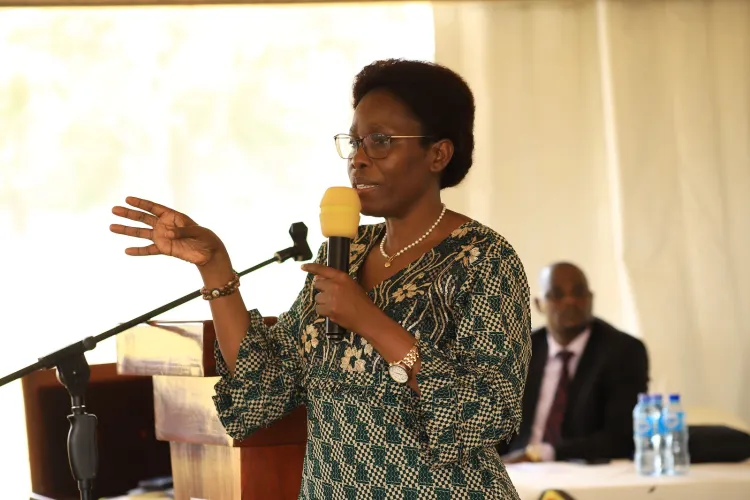Lands minister, Judith Nabakooba, has tipped local leaders on the new ways of handling land matters in a bid to reduce the recurrent cases of land conflicts in the country.
While addressing local leaders from five districts at the National Leadership Institute (NALI) in Kyankwanzi District on February 20, Nabakooba said the Land Act provides for the local council courts to handle cases relating to land disputes.
Leaders in attendance were from Hoima, Kakumiro, Kassanda, Mubende, and Kyankwanzi Districts. These included LCV chairpersons, councilors, LC III chairpersons, National Resistance Movement (NRM) chairpersons on different levels, and NRM leaders.
“The Land Act Cap 227 as amended 2001 gives power to you the leaders to sensitize residents about land rights, interests and responsibilities,” the minister said.
“Do not allow anyone to carry out unlawful evictions. If the landlord wants to use the land, let them first compensate the bibanja holders according to available rates in the area,” she said.
The same Act also provides for the same group to participate in division of land to family members after the death of the owner of the estate.
She tasked all leaders on ground to provide legal education to residents and improve their awareness towards land rights.
“This will develop the capacity of victims to complete administrative and judicial procedures to secure their land claims,” she said.
The minister cautioned village chairpersons against allowing surveyors to do boundary opening on land, arguing this would plant conflicts in their areas.
“Provide mediation and conflict resolution support during boundary harmonization efforts.”
Mr Charles Balala, from the office of the Administrator General, re-echoed Nabakooba’s call for local council leaders to be part of dividing inherited properties.
Attributing to the Succession (Amendment) Act Cap 2022, Balala revealed the criteria considered while dividing inherited estates.
He noted courts of law are guaranteed with supreme powers to handle properties of the deceased before they are shared amongst the beneficiaries.
“You however need to first present authentic documents concerning the land before taking up any step. Many fraudsters hoodwink village chairpersons to take up people’s land after giving them bribery,” Mr Balala said.
He said courts in Uganda are reserved with the power to issue grants to administer estates of deceased persons. These include the probate (for testate estates), letters of administration with the will annexed, and letters of administration for intestate (no will) estates.
Mr Balala defined a probate as a document granted for the estates where the deceased left a will and this is issued basing on the validity of the will.
He revealed the category of people who can be given access to a probate including the executor (heir) appointed in a will, the guardian of the child.
“The executor must not be a minor or a person who has mental illness as provided for under the Sec 184 (I) of the Succession Act.”
Most of the escalating conflicts arise from situations when the deceased leave no will behind, which gives the relatives an opportunity to fight for selfish interests.
Mr Balala said the letters of administration apply but following legal steps to convince the court the documents belong to the family in question.
“You need to present a death certificate or a letter from a local Council (LC), with the executive stating the fact of the death to the Administrator General,” he revealed.
He added: “Section IV of the Administrator’s General’s Act gives the Administrator General authority over estates of deceased persons.”






